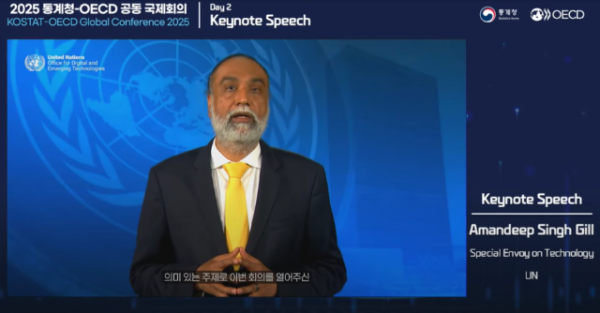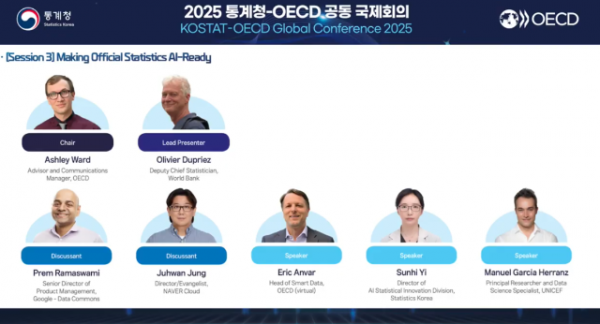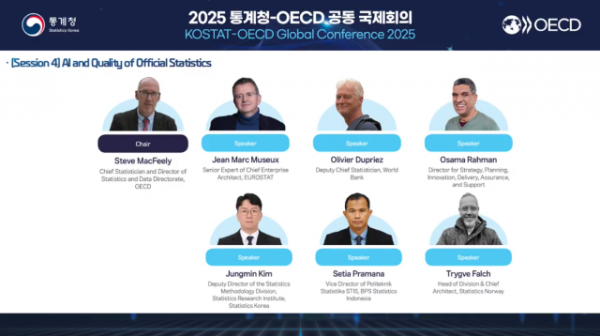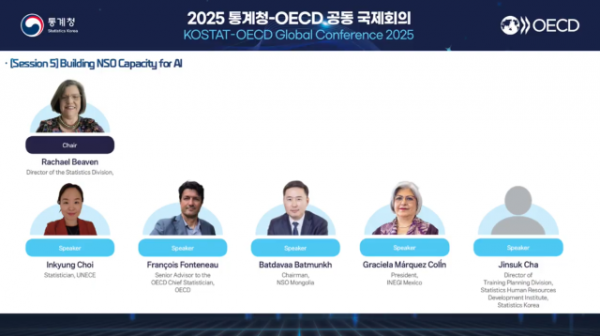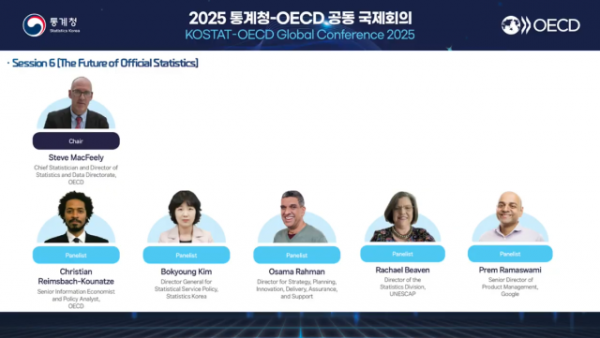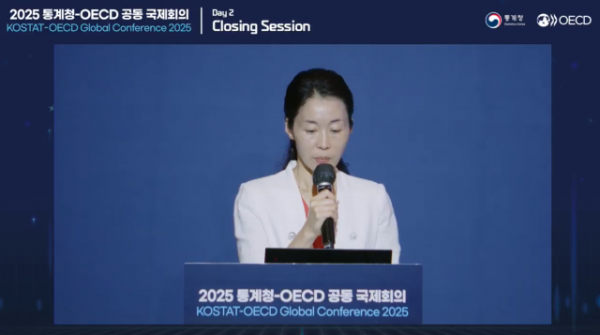2025 National Statistical Office-OECD Joint International Conference D…
2025 National Statistical Office-OECD Joint International Conference Day 2, New Horizons for AI, Data Reliability and Innovation
"Triangle of data quality, standardization, and public-private cooperation, redefining AI and the future of national statistics"
[Korea Distribution Newspaper = Reporter Kim Do-hyung] On September 11, the second day of the 2025 National Statistical Office-OECD Joint International Conference held at Hotel Naru M Gallery in Seoul discussed the direction of national statistics in the AI era and the importance of global data governance under the theme of "AI for Data, Data for AI: Creating the Future of Official Statistics."
The two-day meeting was co-hosted by the National Statistical Office and the OECD, and experts from international organizations such as the United Nations, the World Bank, and UNICEF, private IT companies such as Google and Naver, and national statistics agency (NSO) experts from each country gathered to share knowledge and experience. Amid active communication across the field and online, various strategies and examples were dealt with on how AI and data will be mutually virtuous and improve the quality and reliability of national statistics.
U.N. Secretary-General Amandeep Gill's Video Keynote to Digital, Emerging Technology Special Adviser
Amandeep Gil, the UN Secretary-General's special adviser on digital and emerging technologies, who gave the video keynote speech, made it clear that data quality and standardization are key lenses that influence AI's social influence. "AI is like a telescope, and data is the lens of that telescope," he warned. "Without transparent and accurate data, even the most powerful AI will make wrong social decisions." In addition, he introduced various international cooperation mechanisms such as the 'Global Digital Compact' adopted at the UN General Assembly last year and the establishment of the AI Governance Council, stressing that "data governance is the center of inclusive digital transformation."
AI-Friendly Data, Key to International Standards and Public-Private Cooperation
Olivier Dupreez, deputy director of the World Bank, pointed out the threat of inaccuracies in AI learning data to national statistical reliability and detailed technical conditions such as standardization of metadata and semantic search. "Big tech companies such as Google are redistributors of official statistics, and NSO must provide data in line with AI response to spread information without distortion," he stressed.
Citing AI Hallucination as an example, Pramoon Ramaswamy, head of Google, pointed out that "securing trust beyond numbers is the key." Google's "Data Commons" introduced that it provides users with source verification functions in combination with national statistical data, and said private companies should also join the activation of public data as responsible "data redistributors."
In Korea, Chung Ju-hwan, director of NAVER Cloud, said, "We need to solve the risk of data bias and unverified automatic response with the National Statistical Office," adding that it is essential to secure data reliability and transparency before introducing the Generative AI. He said, "It is also necessary to reset the scope of private data opening for AI utilization."
Eric Mba, head of smart data at the OECD, introduced the results of the 2025 OECD AI readiness survey and pointed out that "the gap between data and metadata quality is the biggest obstacle to AI innovation." He suggested policy directions such as joint investment, strengthening standards, establishing AI frameworks, and creating innovative culture.
Lee Sun-hee, head of the artificial intelligence innovation division at Statistics Korea, announced a plan to develop an ontology-based metadata standard along with limitations of existing SDMX standards. The standard is evaluated as a practical countermeasure for AI to understand semantic relations between statistical concepts and reduce errors caused by differences in definitions by countries.
Manuel Gracia Herantz, UNICEF's chief science officer, stressed the need to build a trust-based data network and an international cooperative platform, saying, "The data gap can lead to a social gap." It emphasized that data is not just a product but a "public good" and also introduced strategies for integrating data, metadata, and documents.
AI Quality and National Statistics Innovation Challenges
In the fourth session, experts specifically discussed the identification of data outliers through machine learning, AI quality management systems, and governance models. The case of Statistics Korea in the UK, Indonesia, and Norway reaffirmed the importance of cultivating not only technology but also organizational culture, infrastructure, and manpower in introducing AI.
Kim Jung-min, an official at the National Statistical Office of Korea, distinguished AI's quality assurance problem from existing statistical quality management and suggested the need for a dual framework led by AI engineers. Indonesia has officially announced the introduction of "PaSSI," an AI platform that adapts to a multilingual environment, and declared improvement of AI-based research efficiency.
The Future of National Statistics and AI Preparedness
The comprehensive discussion presented the direction of future national statistics, including the need for NSO to grow into a reliable "data mediator," the balance between introducing AI technology and maintaining transparency, and expanding participation in civil society. UN and OECD officials reaffirmed the importance of complying with basic principles, international cooperation, and establishing AI-friendly metadata, emphasizing the establishment of a culture of responsibility, trust, and cooperation, not just technological innovation.
At the conclusion of the meeting, OECD Director of Statistics Stephen McPhilly said, "There is no universal solution to AI-related problems, and we need to keep the principles and start small and constantly innovate."
"Countries have shared the direction of response to the challenges faced by AI and national statistics," said Lee Myung-ho, deputy chief of the National Statistical Office. "Korea will strive to build AI-friendly metadata through international cooperation under the leap forward as three AI powerhouses."
The 2025 National Statistical Office-OECD International Conference established an international consensus on the way forward for national statistics in the age of AI and presented a blueprint for innovation and responsible cooperation based on data quality, transparency and reliability. This suggests that it is the beginning of a global partnership to restore public trust through data and lead social change in the age of AI.
Choi Hyun-Shim MC 2025 Statistics Korea-OECD Joint International Conference Hosted
2025 통계청-OECD 공동국제회의 2일차, AI와 데이터 신뢰성 그리고 혁신의 새 지평
“데이터 품질·표준화·민관협력의 삼각축, AI와 국가통계 미래를 재정의하다”
[한국유통신문= 김도형 기자] 9월 11일, 서울 호텔 나루 엠갤러리에서 개최된 2025 통계청-경제협력개발기구(OECD) 공동국제회의 2일차는 “AI for Data, Data for AI: 공식통계의 미래를 만들다”라는 주제로, AI 시대 국가통계가 나아가야 할 방향과 글로벌 데이터 거버넌스의 중요성을 심층 논의했다.
이틀간 진행된 회의는 통계청과 OECD가 공동 주최했으며, UN, 세계은행, 유니세프 등 국제기구 전문가들과 구글, 네이버 등 민간 IT기업 관계자, 그리고 각국 국가통계기관(NSO) 전문가들이 한자리에 모여 지식과 경험을 공유했다. 현장과 온라인을 넘나드는 활발한 소통 속에, AI와 데이터가 어떻게 상호 선순환하며 국가통계의 품질과 신뢰성을 제고할 것인가에 대한 다양한 전략과 사례가 다뤄졌다.
영상 기조연설을 맡은 아만딥 길 유엔 사무총장 디지털·신흥기술 특보는 데이터 품질과 표준화가 AI의 사회적 영향력을 좌우하는 핵심 렌즈임을 분명히 했다. 그는 “AI는 망원경과 같고, 데이터는 그 망원경의 렌즈”라며 “투명하고 정확한 데이터 없이는 가장 강력한 AI도 잘못된 사회적 결정을 내릴 것”이라고 경고했다. 또한, 지난해 UN 총회에서 채택된 ‘글로벌 디지털 콤팩트’와 AI 거버넌스 협의체 설립 등 다각적 국제 협력 메커니즘을 소개하며 “데이터 거버넌스는 포용적 디지털 전환의 중심”이라고 강조했다.
AI 친화적 데이터, 국제표준과 민관협력의 핵심
세계은행의 올리비에 뒤프리즈 부국장은 AI 학습 데이터의 부정확성이 국가통계 신뢰성에 미치는 위협을 지적하며, 메타데이터 표준화와 시맨틱 검색 등 기술적 조건을 상세히 설명했다. “구글과 같은 빅테크 기업은 공식통계의 재배포자이며, NSO가 AI 대응에 맞춰 데이터를 제공해야 왜곡 없는 정보 확산이 가능하다”고 그는 강조했다.
구글의 프라문 라마스와미 책임자는 AI 환각(hallucination) 문제를 사례로 들며, “숫자 이상의 신뢰 확보가 관건”임을 지적했다. 구글이 추진하는 ‘공용 데이터 커먼스(Data Commons)’는 국가통계 데이터와 결합해 사용자에게 출처 검증 기능을 제공한다고 소개하면서, 민간 기업 또한 책임 있는 ‘데이터 재배포자’로서 공공 데이터 활성화에 동참해야 한다고 말했다.
국내에서는 네이버클라우드 정주환 이사가 “데이터 편향성과 무검증 자동응답의 위험을 국가통계청과 함께 해결해야 한다”며 생성형 AI 도입에 앞서 데이터 신뢰성과 투명성 확보가 필수라고 언급했다. 그는 “AI 활용을 위한 민간 데이터 개방 범위 재설정도 필요하다”고 했다.
OECD의 에릭 엠바 스마트데이터 책임자는 2025년 OECD AI 준비도 조사 결과를 소개하며, “데이터와 메타데이터 품질 격차가 AI 혁신에 가장 큰 걸림돌”이라고 지적했다. 그는 공동 투자, 표준 강화, AI 프레임워크 구축, 혁신문화 조성 등의 정책 방향을 제시했다.
한국 통계청 이선희 인공지능혁신과장은 기존 SDMX 표준 한계와 함께 온톨로지 기반의 메타데이터 표준 개발 계획을 발표했다. 이 표준은 AI가 통계 개념 간 의미 관계를 이해해 국가별 정의 차이에서 오는 오류를 줄이기 위한 실질적 대응책으로 평가받는다.
유니세프의 마뉴엘 그라시아 헤란츠 수석과학담당관은 “데이터 격차가 사회 격차로 이어질 수 있다”며, 신뢰 기반 데이터 네트워크와 국제 협력형 플랫폼 구축의 필요성을 역설했다. 데이터는 단순한 상품이 아닌 ‘공공재’라는 점을 강조하며, 데이터·메타데이터·문서 통합 플랫폼 전략도 소개했다.
AI 품질과 국가통계의 혁신 과제
4번째 세션에서는 머신러닝을 통한 데이터 이상치 식별, AI 품질 관리 시스템, 거버넌스 모델 등이 전문가들에 의해 구체적으로 논의됐다. 영국, 인도네시아, 노르웨이 통계청 사례를 통해 AI 도입에서 기술뿐 아니라 조직문화와 인프라, 인력 양성의 중요성이 재확인됐다.
한국 통계청 김정민 사무관은 AI의 품질 보증 문제를 기존 통계 품질 관리와 구분하며, AI 엔지니어 주도의 이중 프레임워크 필요성을 제안했다. 인도네시아는 다언어 환경에 적응하는 AI 플랫폼 ‘파시(PaSSI)’ 도입을 공식화하며 AI 기반 조사 효율성 개선을 선언했다.
국가통계의 미래와 AI 준비도
종합 토론에서는 NSO가 신뢰할 수 있는 ‘데이터 중재자’로 성장해야 한다는 점, AI 기술 도입과 투명성 유지의 균형, 시민사회 참여 확대 등 미래 국가통계의 방향성이 제시됐다. UN과 OECD 관계자들은 기본 원칙 준수와 국제 협력, AI 친화적 메타데이터 구축의 중요성을 재확인하며, 단순 기술 혁신이 아닌 책임·신뢰·협력 문화 확립을 강조했다.
회의를 마무리하며 OECD 스티븐 맥필리 통계국 국장은 “AI 관련 문제에 만능 해법은 없으며, 원칙을 지키며 작게 시작해 꾸준히 혁신해야 한다”고 밝혔다.
한국 통계청 이명호 차장 직무대리는 “AI와 국가통계가 직면한 도전과제에 각국이 대응 방향을 공유했다”며 “한국은 AI 3대 강국 도약 기조 아래 국제 협력을 통해 AI 친화적 메타데이터 구축에 힘쓸 것”이라고 강조했다.
이번 2025 통계청-OECD 국제회의는 AI 시대 국가통계가 나아갈 길에 대한 국제적 공감대를 확립하고, 데이터 품질·투명성·신뢰성을 근간으로 한 혁신과 책임 있는 협력의 청사진을 제시했다. 이는 곧 데이터를 통한 공공 신뢰 회복과 AI 시대 사회 변화를 주도하기 위한 글로벌 파트너십의 시작임을 시사한다.
<저작권자(c)한국유통신문. 무단전재-재배포 금지>
기사제보 및 사회적 공헌활동 홍보기사 문의: 010-3546-9865, flower_im@naver.co
검증된 모든 물건 판매 대행, 중소상공인들의 사업을 더욱 윤택하게 해주는
Comments

